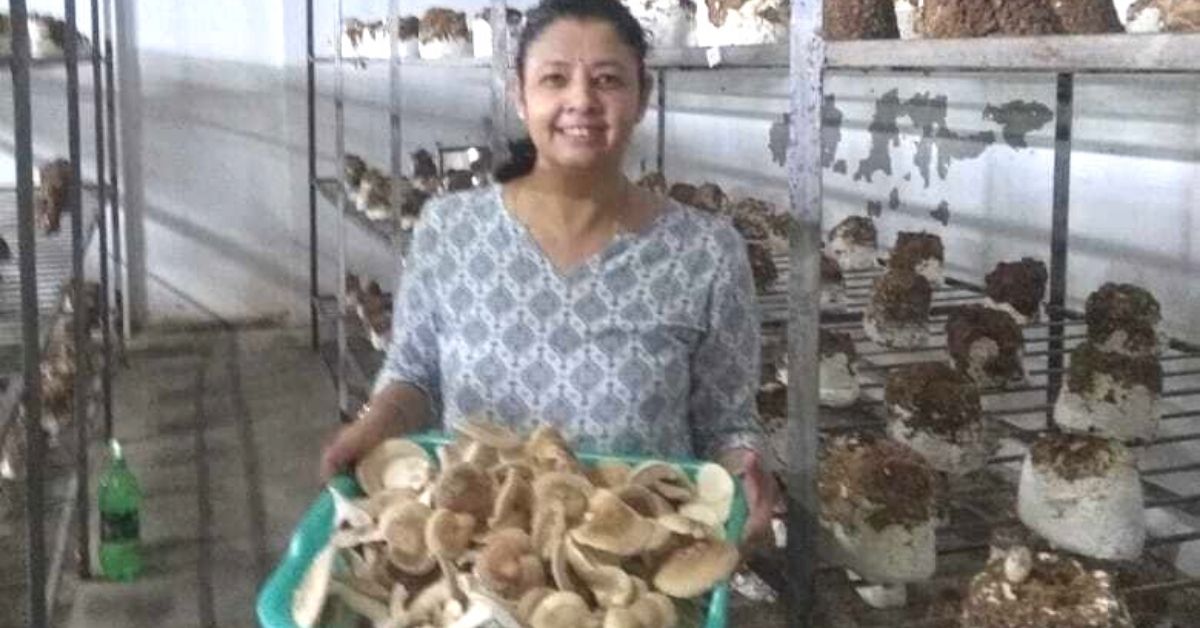She Quit Her IT Job To Help 2000 Women Earn 30% More Through Mushroom Farming
Hiresha Verma's startup Hanzen International helps women across Uttarakhand earn stable livelihood through mushroom farming, growing varieties such as oyster, milky, and portobello, as well as medicinal mushrooms like shiitake, ganoderma, cremini and enoki varieties. She also sells produce in different parts of India through Han Agrocare

In 2013, Hiresha Verma, a native of Dehradun, watched the horrors of the Kedarnath flash floods unfold on her television screen. The disaster, which was the result of a cloud burst, had left hundreds dead and thousands missing.
Hiresha, who was in Delhi at the time pursuing an IT career, was so moved by what she was seeing that like many others, she rushed to the affected areas in Uttarakhand with an NGO to provide aid and relief to the victims of the natural disaster.
“During my interactions with the women of the area, I realised that many of their husbands were now missing, never to return. These women were in a state of despair and had lost all their means of livelihood, support and hope,” she recalls in conversation with The Better India.
Hiresha, who is a graduate in chemistry and botany with a post-graduate in business management, decided to use her skills and knowledge for the betterment of these women. She began researching solutions to help these women come out of this unprecedented crisis.

“Mushroom farming was among the many ideas I thought about. Uttarakhand’s weather is suitable for growing the crop. Moreover, I had to find a concrete and viable solution for women that could sustain over a long period of time,” she says.
So Hiresh invested Rs 2,000 to begin experimenting with growing mushrooms at her home in Dehradun. “After a few successful trials, I underwent training at the Directorate of Mushroom Research in Himachal Pradesh. The same year, I established Hanzen International, a mushroom farming venture on 1.5 acres of land by setting up ten huts with 500 bags in each of them,” she adds.
In 2013, Hiresha quit her job for good and moved to Dehradun to start mushroom farming. Since then, she has helped over 2,000 women in the region gain sustainable livelihood and increase their income by around 30%, she says.
Growing 1,000 kilos of mushrooms a day
As her company gained stable ground, many women approached her to seek knowledge and skills to pursue mushroom farming. “I provided training, spawns, and other material free of cost to them,” she says, adding that all the profits from the business went as investments in helping the women.
She adds that the practise continued for a year or more. Her success earned her the Uttarakhand State Award for mushroom farming in 2015.
Hiresha notes an initial challenge was that the compost for mushroom growing fell short. “The state government provided compost under subsidies only for three months a year. But the women wished to grow mushrooms throughout the year to ensure steady income. Hence, we established our compost processing unit on the land to provide the same,” she says adding, that it took eight unsuccessful attempts before the startup could devise the perfect compost mix.
Hiresha adds that as more women joined, she realised the need for a scientific approach towards increasing yield, reducing losses and optimising production.

“In 2015, we procured a loan of Rs 80 lakh to set up air-conditioned units that enabled the farm setups to maintain optimum weather conditions. We also set up a laboratory to develop spawns on-site and improve the production rate. It allowed the production to increase to 100 kilos a day,” she explains.
Hiresha says that in 2016, the yield increased to 500 kilos a day. “At present, the farm harvests 1,000 kilos of mushrooms a day. This includes varieties like oyster, milky, and portobello, as well as medicinal mushrooms like shiitake, ganoderma, cremini and enoki varieties,” she says.
In 2019, she also founded Han Agrocare, a retail brand to sell the produce in different parts of India. “Women farmers cultivate the mushrooms and sell them by themselves in the market or approach us to help with the market linkages. In recent years, they have started growing medicinal mushrooms and selling them to us. We market them on retail and commercial platforms,” she says.
Beena Keerti, a farmer from the Terai district of Uttarakhand, says, “I started mushroom farming on a small patch of land last year. It has ensured a stable source of income and a safety net in case I incur heavy damage from other crops on the farm.”
Beena adds that the additional income has helped her provide better education for her children and earn respect and status in the community. “Like me, there are other women who have realised the importance of education and have started sending their daughters to school as well,” she adds.
Nothing is impossible
In addition to growing mushrooms and helping farmers, the startup has also entered food processing over recent years.
“In the past couple of years, we have conceived value-added products such as pickles, nuggets, soup, protein powder, tea, coffee and sauces which are sold in Punjab, Haryana, Delhi and regional parts like Poudhi, Gharwal and others,” she says.
The overall business earns sales of Rs 1.5 crore a year, Hiresha says.

She also works with NGOs to help farmers earn additional income through mushrooms. “Moreover, we have identified 5,000 tribal women who have no land or a sustained source of livelihood. Plans are underway to train them in growing medicinal mushroom varieties and provide them financial independence,” she adds.
Of her success, Hiresha says, “Women farmers are independent and have been able to live with dignity and self-respect in the community and villages. Watching them grow in various aspects of life, especially when earlier, they had never even stepped out of their homes, gives me a feeling of fulfilment,” she adds.
Hiresha notes that one can achieve anything if they put their heart into it. “When I started the initiative, friends and family laughed at me and were sure that I could never succeed. They mocked me, saying that I would have to dirty my hands in cow dung. But today, I have earned success for myself and thousands of women, which makes me proud,” she says.
For more information or to buy Han Agrocrare’s products, you can visit their website.
Edited by Divya Sethu
If you found our stories insightful, informative, or even just enjoyable, we invite you to consider making a voluntary payment to support the work we do at The Better India. Your contribution helps us continue producing quality content that educates, inspires, and drives positive change.
Choose one of the payment options below for your contribution-
By paying for the stories you value, you directly contribute to sustaining our efforts focused on making a difference in the world. Together, let's ensure that impactful stories continue to be told and shared, enriching lives and communities alike.
Thank you for your support. Here are some frequently asked questions you might find helpful to know why you are contributing?













